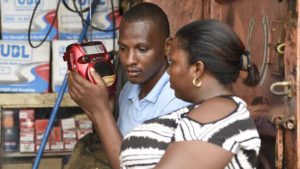 by Alagi Yorro Jallow.
by Alagi Yorro Jallow.
Brilliant Radio commentators/presenters are the voice of any radio station; they create the tone and style of the station and establish a relationship for listeners. An excellent radio commentator/ presenter knows how to captivate and engage their audience. One could not help but think about those glory days of Radio Gambia during Independence anniversary celebrations or when covering national events. When early mornings police and school children parades at the central Mccarthy Square and the afternoon sports events marking the anniversary, the volume of radio Gambia would be brought down, and the volume of the radio cranked up so that we could hear either any of the voices Saul Njie, Bora Mboge, Malick Jones, Alhagie Mansour Njie, Lalo Samateh, Assan Njie, Sering Faye, Modou Joof, Mbemba Tambedou, Amie Joof -Cole, Marcel Thomasi, Alieu Darboe, Saikou Beyai and Musa Camara commenting and reporting. We heard them reporting during the historic Independence Day activities. Their commentary comprised of stars like top-notch. The faces behind the voices: They are the Gambia’s best broadcast journalists, and traditional commentators.
Moreover, their competencies are beyond contestation with deadpan humor and talent are their other names. Now that they are the subject of near-endless social media chatter and they are household names in the Gambia, it is only proper that they are given Gambia’s highest honors. Moreover, the way Gambian is effusively singing praises for them. The missing voices.
Reporting, analysis, and commentary — those are the three predominant types of content those glorious days of Radio Gambia’s newsroom offers listeners. Reporting and analysis make up most of what Radio Gambia puts out, especially during Independence anniversary celebrations. However, it is the tiny category of commentary and political also cultural commentary, specifically, since that makes up the majority of Radio Gambia reporting at national events) that is driving an outsized number of listeners to nostalgia.
In my experience, its several things Radio Gambia offers to its listeners during Independence Day celebrations. Diversity and originality are vital; they offer something that’s going to engage the people that they cannot get elsewhere. An excellent professional sound on-air sure helps. Furthermore, personality and people like to be entertained as well as informed. It also helps to know the target audience nationwide. The humorous per se, from the Queen’s English language and vernacular commentary and reporting, has been an attribute of the trademarks of Radio Gambia and its pool of brilliant staff.
Radio Gambia stick with the sparring partner format, but switch up the voices, adding diversity and perspectives. That is more work for the producers, but listeners would hear a variety of viewpoints they are not getting now.
Finally, Radio Gambia has done away with professionalism in commentary and reporting altogether of its trademark public broadcasting, at least on the radio. Change is hard, and Radio Gambia has considered English and traditional communication to be an essential part of its mix of offerings for decades. Nevertheless, one thing the journalism world is not lacking these days is opinions. What if Radio Gambia took that time and devoted it to more reporting current affairs and national events?

